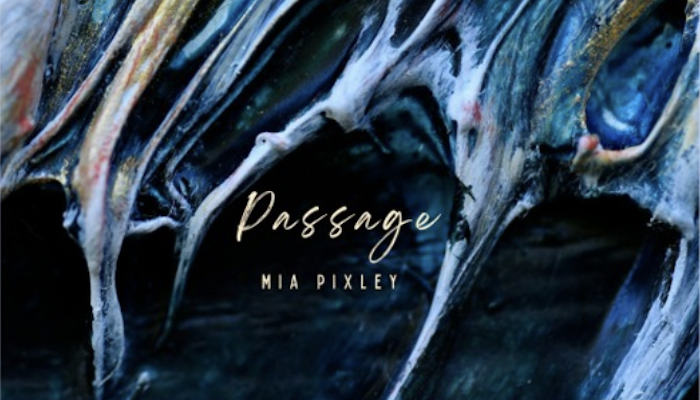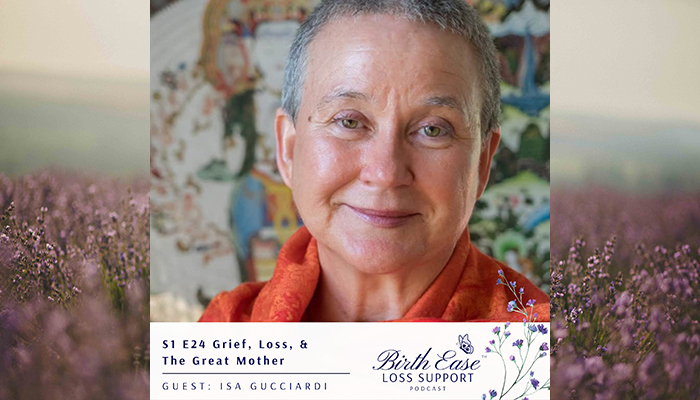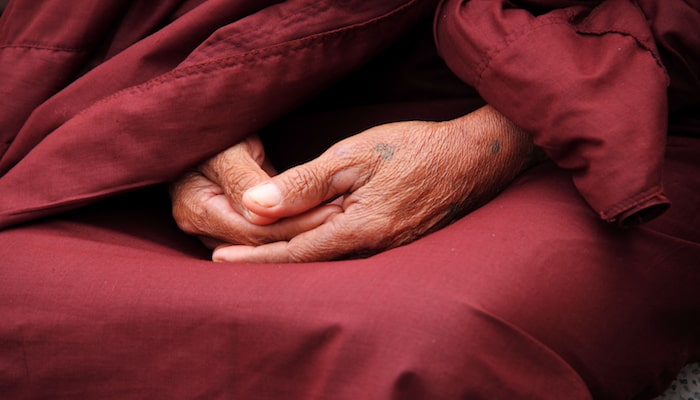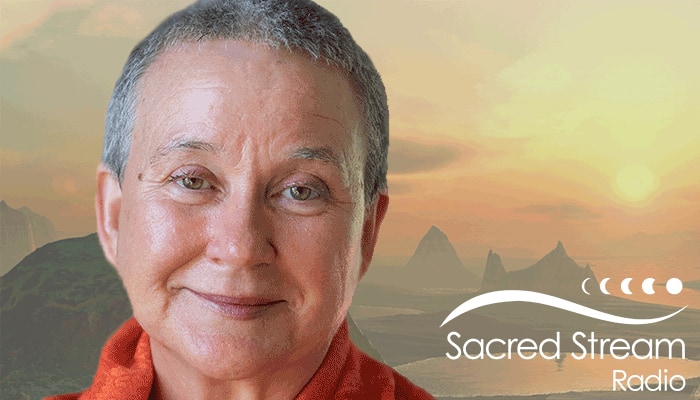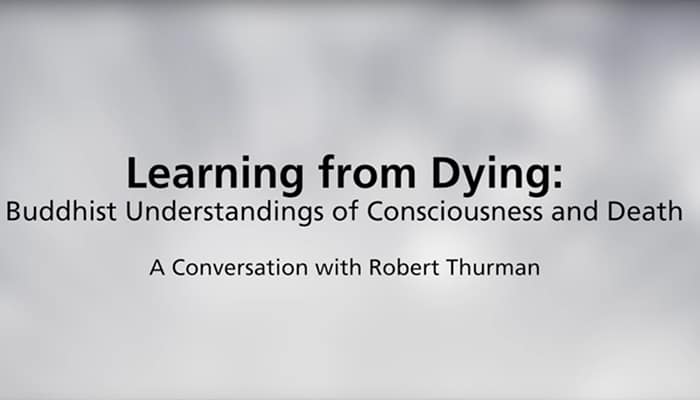Category: Death
Special Announcement: Mia Pixley’s Passage
Passage is an interdisciplinary call and response poetry, music, and prose project inspired by grief and created at the height of the pandemic. The project hinges around a single poem written by poet, scholar, and psychoanalyst, Forrest Hamer, Ph.D. Dr. Hamer sent me, a practicing psychologist, cellist, vocalist and composer, his poem, Passage, after I had asked if he had any poems about the ocean – the greatest destroyer, life-giver, and in many ways, teacher of loss. Held by his words, Hamer’s poem spoke deeply to my feelings of grief. And I was inspired to create a series of musical pieces from his single poem. Afterwards, I shared the music with him. He was, in turn, touched.
On the Air: Birth Ease Loss Support Podcast: Episode 24: Grief, Loss, and The Great Mother with Isa Gucciardi
In this interview with Birth Ease Loss Support Podcast host Michelle Smith, Isa Gucciardi provides insights from her over twenty-five years of experience in supporting the bereaved. She shares the initiations that women experience throughout their lifetime which include our own birth, puberty, menses, the first sexual experience with another person, giving birth, menopause, and death. Isa explains the Great Mother as a source of wisdom, creative intelligence, and nurturing that can bring comfort and healing into the journey and complexity of grief. Isa and Michelle also discuss holistic ways to support the grief process such as plants, herbal sprays, homeopathic remedies, and meditation.
Article: Bridging the Worlds between Life and Death with Shamanic Practice
By Isa Gucciardi, Ph.D.
As part of Tarka’s “On Death” issue, I have been asked to speak about the approach to death that my tradition, that of shamanic practice, follows. Some of the questions I have been asked to address are: What is death from the perspective of your tradition? What transmigrates, if anything, from the perspective of your tradition? What key text, verse, or poem offers insight or clarity around the experience of death? How has an experience of death in your life informed your teaching? What is a practice that directly addresses our relationship with death? I have tried to address all of these questions in this short exploration of the shamanic worldview regarding death.
In his book about the Australian Aboriginal experience, Voices of the First Day, Robert Lawlor offers a statement regarding Aboriginal views about death which are reflective of a larger, more general shamanic worldview. He says, “Death, in the Aboriginal view, is not a termination or a dislocation from this world to another; rather it is a shift of the center of one’s consciousness to invisible, subjective layers that are substrate to, and involved within, the natural world of mind and matter.”
Podcast: Episode 57: 2019: A Retrospective
This episode is a retrospective of some of the highlights of the past year. You’ll hear excerpts from Laura Chandler’s interviews with bestselling authors Dawson Church and Christina Rasmussen, Grammy nominee Barbara Higbie, and renowned channel and author Paul Selig. Our featured music includes songs from Barbara Higbie, Dan Walters, and master sarod player Rajeev Taranath, as well as Sacred Stream’s very own Katie Rudman and her duo, Heddwen.
Blog: Everybody Hurts: When Those You Love are Grieving
By Laura Chandler
As the REM song says, “Everybody hurts, sometimes.” It is the inescapable truth we all share as humans. We are going to experience pain. The holidays are a particular source of pain for people who have lost loved ones. Those celebratory holiday gatherings and fun parties can be a source of sorrow as they remind us of what is missing from our lives. Often times, for those who have lost a close friend or family member, the holidays are a time to withdraw, and a time to seek refuge in the quiet of solitude rather than the rush of holiday fervor. So, how do you help someone who is grieving?
Blog: Aging Gracefully In A Youth Culture
By Laura Chandler
In a recent article in The Atlantic titled, “Your Professional Decline is Coming (Much) Sooner Than You Think” (July 2019), the author, Arthur Brooks, looks for a silver lining as he explores the idea of his own unavoidable decline and the loss of relevance he will suffer in old age. His investigation takes him to different psychological principles, Darwin’s theory of evolution, happiness studies, and ultimately to an Indian guru, Acharya. His question to this master was this: “Many people of achievement suffer as they age, because they lose their abilities, gained over many years of hard work. Is this suffering inescapable, like a cosmic joke on the proud? Or is there a loophole somewhere—a way around the suffering?”
Blog: Listening to Grief
By Isa Gucciardi, Ph.D.
Grief is an uncompromising teacher, but it can take you to depths within yourself and teach you things nothing else can. It is only when we sit down with grief and receive what it has to offer us that healing can begin.
One of the greatest teachings grief has to show us is that the world is not what we thought. This is important because we all have misconceptions about the nature of reality and about our agency in the world. It is common to become deluded about what is real and what is not real. Often people think they can avoid or control pain in an effort to generate a reality where it does not exist. In this way, delusion is the basis for suffering. It takes strong medicine to break through delusion, and grief offers this medicine by providing the opportunity to unravel our misconceptions about the nature of reality.
Podcast: Episode 43: Buddhist Perspectives on Death
This episode features a talk by Isa Gucciardi, Finding Meaning in Loss, which she gave at the Reimagine End of Life Conference in Berkeley, CA. In this thoughtful and uplifting talk, Isa encourages us to create the spaciousness required to truly be with the experience of loss, grief, and even death. She examines ways of navigating loss, and explores Buddhist perspectives on theme, while also offering practices that will help us approach death, our own and those we love, with awareness and grace.
Video: Learning from Dying: Buddhist Understandings of Consciousness and Death
Renowned Tibetan Buddhist scholar and Columbia University Professor Robert A.F. Thurman is joined in conversation by his colleague Isa Gucciardi and UCSF’s Eve Ekman and David Bullard. They explore Buddhist understandings about consciousness and death.
Blog: Buddhist Perspectives on Grief and Loss
By Isa Gucciardi, Ph.D.
In Robert Thurman’s prelude to his translation of Bardo Thodol, commonly translated as The Tibetan Book of the Dead, he takes to task scientific materialists’ perspective that death is a terminal state, a state of nothingness where life is destroyed. He points out that these materialists “have never observed even one material thing become nothing. Why should the energy reality of a state of awareness [life] ……be the exception to the law of physics that energy is conserved and only transformed?”
I have always appreciated Dr. Thurman’s willingness to take on monolithic prejudices, in the name of science, in response to spiritual questions. I have always felt the wholesale rejection of notions such as the possibility of life after death and the existence of spirit was highly unscientific. In order to step into the universe of life beyond death from the Buddhist perspective, we have to allow ourselves to be disabused of the ways in which we may have unwittingly digested the viewpoints of scientific materialism on these subjects simply because they dominate in our education system.
Article: Reflections on Loss at the Winter Solstice
By Isa Gucciardi, Ph.D.
We are gathered here this evening of the winter solstice. This is the longest night of the year, and it is honored by many traditions as a sacred and rich time. In Latin, solstice means sun set still and winter solstice is the great stillness before the sun’s strength builds, and days grow longer. It is a time when everything lies dormant in the silent night. At this time of year, the earth reaches into the darkness of the winter night and our experience is driven by that darkness. The days are shorter and shorter as the nights invite us to focus more deeply inward, to reach more and more fully into the deepest recesses of our psyche.
Article: Death, Acceptance, and Grace
By Isa Gucciardi, Ph.D.
When a loved one is dying or has died, our defenses to all of the complicated aspects of our relationship with that person are often shaken. If we are lucky, we are less able to keep in place all the unconscious agreements with that person and we are afforded a time to explore those agreements and how they affect our ability to be honest with ourselves. To deepen this process, it is often helpful to use hypnosis and its ability to further weaken the conscious defenses we have to death in order to more fully understand ourselves.
This part of the grieving process, this deeper exploration of the meaning of how death highlights these hidden places in our relationships, is often masked by the homilies of organized religion, the need to save face in front of family members, and the urging by well-meaning friends to just get on with our lives. Even if we find we are able to explore these places, we rarely have the luxury of doing so with the person who is dying.

